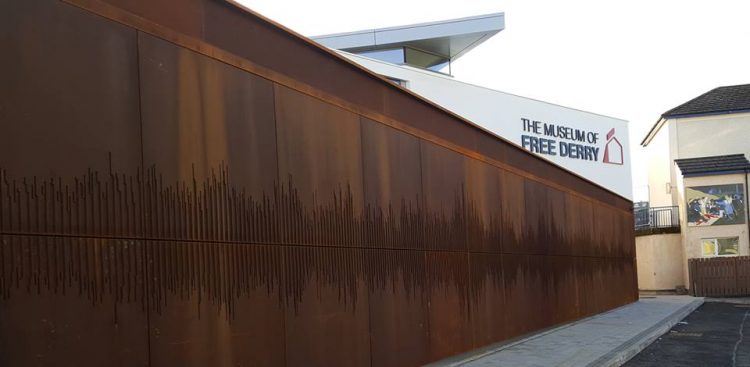 RELATIVES of a number of Bloody Sunday victims have demanded the names of murdered police officers and British soldiers be removed from a Derry museum.
RELATIVES of a number of Bloody Sunday victims have demanded the names of murdered police officers and British soldiers be removed from a Derry museum.
Kate Nash says she is “disgusted” that the names of dead British soldiers are included in an exhibition at the newly opened museum, just yards from where her brother was shot by paratroopers.
The names of everyone killed in the conflict in Derry from 1969 to 1972 – IRA, civilians, British Army and police – flash up on a screen at the Bogside Museum, owned by the Bloody Sunday Trust.
Only a few of the names are of soldiers or police officers, including David Montgomery (20), an RUC officer who was shot dead along with his colleague Peter Gilgunn (26) as they drove along the Creggan Road in January 27, 1972 and Richard Ham (20), a soldier with the Royal Artillery who was shot dead while on foot patrol on the Foyle Road.
The Museum of Free Derry says it is “totally unrepentant” about including those names.
But Ms Nash (67), whose 19-year-old brother William was among those shot dead on Bloody Sunday, has called on the museum to remove them immediately.
Kate and her sister Linda gathered over 1,000 names on a petition to have the exhibition removed and yesterday delivered the signatures to the museum alongside Liam Wray, whose brother Jim was also killed on Bloody Sunday and Michael Bridge who was wounded on the day. She says there are protests planned over the coming days at the museum site.
“I really don’t like the idea that military and police, members of organisations that have been responsible for state killings, are remembered in a museum which holds personal artefacts and tells the story of the 14 innocent people who were murdered on the streets just outside it,” she said.
“It disgusts me that they are remembering British soldiers and police officers when my brother was murdered by British soldiers right outside their front door. I would ask the Bloody Sunday Trust to take these names down.”
In a statement put on on their Facebook page last week, the museum defended their actions, saying that the display has been part of an exhibition since it opened in 2007 and claimed that during that time ‘no one has raised any concerns about it’.
The statement reads: “There is a visual display within the museum that lists all of those killed within the Free Derry area between 1969 and July 1972.
“It includes brief details, and photographs where available, of all of those killed, including local civilians, republican volunteers, members of the British Army and RUC.
“We believe that it is important that we list all of those killed in this period, not only because it is historically accurate but also because, unlike others who would align themselves with the DUP, TUV and British government, we do not believe in any sort of hierarchy of victims.
“It is a purely factual listing. It is not a commemoration or a judgement of any sort.
“This display has been part of the exhibition in the Museum of Free Derrysince it opened in 2007 and since then it has been seen by many tens of thousands of people, including many victim’s families.
“In that time no one has raised any concerns about it. All information within this display is in the public domain.
“Since it was included as part of the exhibition when it first opened in 2007 it bears no relation to any allegations that were made in 2014 about a so called ‘memorial garden to British soldiers’, and was not a part of any deal made with any funder.
“No funding body, or other organisation, has any input into the editorial policy of the Museum of Free Derry.
“Members of this community who lost their lives during that period are also included elsewhere in the museum, in the relevant section of the narrative.
“This display is included in a section of the museum which specifically highlights the lack of any criminal charges to date brought against British security force members for killings they carried out in this area.
“Since four of the five staff members in the museum lost loved ones in the conflict, as well as a number of members of the board of directors, it cannot be reasonably said that we are insensitive to victims’ feelings on this, or any other, issue,” the statement concludes.





